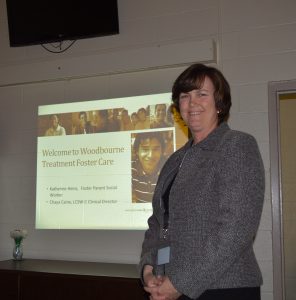Woodbourne Center: Treatment foster care offers kids chance at ‘real life’
Society has long understood that stability in the home is of paramount importance in the rearing of a child. But what happens when a child’s home life is in turmoil or irreparably shattered? When circumstances or medical issues affect a child’s mental health, and she begins acting out in a desperate plea for love and attention? In the Baltimore area, such troubled youth often end up in the caring homes of foster parents who are associated with the Woodbourne Center.
Woodbourne Center provides a wide range of psychiatric services for youth with behavioral and emotional issues. The continuum of care includes treatment foster care for boys and girls, from birth to age 21, psychiatric residential treatment for male youth, ages 12-18, and a specialized school.
Woodbourne currently has 75 children in its program – 45 of which (all boys) are in residential care at its Baltimore campus. The 30 remaining children are being housed by concerned foster parents.

“The average length of stay at the Residential Treatment Center is between nine and eleven months. But the reasons for becoming committed to the Department of Social Services (DSS) are the real compelling stories,” said Tom Fitzgerald, Admissions Supervisor at the Woodbourne Center. “That typically happens when a child’s parent is unable to care for the child, either due to their own issues or the child’s issues, which would prevent even the most competent of parents to sufficiently manage the child’s needs.”
Chaya B. Caine, Clinical Director of Treatment Foster Care at Woodbourne Center, told the Baltimore Post-Examiner, “The ideal for every child is placement with a caring family.”
“For the youth in Treatment Foster Care (TFC), all of our clients would be in foster care to start with. They have already become involved in the ‘system’, and a decision has been made by a judge that they need to be removed from their parents or guardians. On top of that, all of our kids have some kind of mental health diagnosis, which makes them eligible for an extra layer of services and better-trained parents that you find in TFC. Our clients have all had some type of assessment and are appropriate for living in a TFC home in the community.”
To better understand the programs offered by Woodbourne and the challenges of fostering a child with a mental health diagnosis, we recently attended one of Woodbourne’s informational meetings for prospective foster parents.
The meeting was led by Katherine Ziegler Heinz, the Foster Parent Social Worker for Woodbourne Center. Heinz is responsible for the recruitment of new foster families, as well as working with Woodbourne’s current foster parents. Also present were Chaya B. Caine, and four prospective foster parents: Ashley Chambliss, Augin Gray, Joyce B., and Pansie Dean.
“Foster care is needed when children cannot safely remain in their home. It is intended to be short term,” explained Heinz. “TFC is more intensive, because a child may need additional support or services.”

The additional services may take shape in a number of different ways. Children often arrive at Woodbourne with nothing but the clothes on their back, so government stipends and an in-house Care Program are available to cover the expense of buying pajamas, toiletries, school uniforms, etc. TFC also offers monthly training for foster parents.
What does it take to be a foster parent?
> Applicants must be over 21
> No criminal background
> No child protective services charges
> Valid drivers license and a reliable car
> Financially stable/stable residence
> High school diploma
> Willing to be part of a team
“Your home must be safe, both inside and out. It must pass a health and fire department inspection. The foster child must have their own bed.”
Making Sure All Family Members Are On Board
Heinz said that, once the preliminary requirements have been met, prospective foster parents must complete 24 hours of pre-service training. There are also background checks for anyone in the household over the age of 18. The state requires medicals for all family members, plus they look at the applicants’ driving records. First aid and/or CPR certifications are also part of the qualification process.
Once the applicants meet all of the above criteria, Woodbourne undertakes an additional home study. This will include several home visits with all family members living at the residence to assure that everyone is on board with the idea.
“You don’t want an already troubled child to enter a foster home situation and find that one of the family members actually resents them being there.”
What does it cost to foster a child? The numbers vary, but given the special circumstances with the children at Woodbourne, TFC offers a higher compensation.

“The state-mandated board rate is $833 a month plus an additional $700 for caring for children with emotional issues. An additional stipend may come from the state, depending on the difficulty of care. Funds are also available for activities, such as summer camp, karate, etc. The goal here is to help the fosters maintain a semblance of normalcy. Need more money? Ask the DSS,” said Caine.
“The money is tax-free, but potential foster parents must not look at this as a way to maintain their household.”
“That’s why one of the things we look at is the financial stability of the household. Do you have an adequate salary? Are you behind on your mortgage payments?”
“There is also help with such things as dresses for prom night,” added Heinz. “Preparing for prom night can be stressful for any family. That stress is multiplied when you have a foster child situation.”
Heinz noted that clothing kids while in foster care may also become an issue because of the rapid weight gains experienced by children on Psychotropic medications. Again, she reiterated, financial help is available.
Financing foster care is clearly a major concern, but several attendees also asked about professional and emotional support?
“What makes Woodbourne TFC special is the round the clock support. You can really reach out to us 24/7,” said Heinz.
Even so, Woodbourne expects a huge degree of flexibility with its foster parents.
Some foster parents have knit together their own support system, either calling on family members or other foster families who will spell the parents now and then or organize group activities. One example offered was a situation where several foster families would gather together every Sunday during football season to enjoy a communal game day. In another case, it’s the foster community coming together to enjoy a yearly banquet.
Traveling With A Foster Child
What about vacations? Can foster children travel out of state?

“Yes!” exclaimed Caine. “The state is very clear in holding that the child should have opportunities to do things like travel. That could mean going across the Pennsylvania line or into Virginia or DC for a day trip. We’ve actually heard of FP’s who obtained passports and took their kids on a cruise. We think that’s amazing!”
Barring a hopeless personality conflict or some kind of a safety issue which would speed the process, the shortest time a foster child would be in a home would normally be 30 days. Foster parents can sign up for two children, though more and more, the state is trying to keep siblings together. That may mean three kids in one foster home or (with a special waiver) four.
Having listened to the presentation, we asked the four attendees for their feedback. What drew them to the meeting? And do they think foster parenting is right for them?
Ashley Chambliss said she saw the ad for the meeting on Craigslist.
“I started thinking about being a foster parent as long as 5 years ago, but at the time, I was still in college and knew I’d have to be settled before I could even begin to seriously look into fostering. I’m not sure what to expect, so I’m anxious to see where this goes once the process gets started.”
Ashley said she is looking to potentially foster a child elementary or middle-school aged. “I definitely don’t want a high-schoooler. I’m only 24, and my boyfriend is about the same age, so caring for a late teen would not be a good fit.”
Augin Gray, the other newbie in the group, admitted she was on the fence with the idea of becoming a foster parent.
“I’ve talked a lot with my girlfriend, and she told me fostering can be an up and down situation. The most important thing is to find someone you don’t have any problems with.”

Joyce B., who has been a foster mother for over twenty-five years, said in her experience, the difference between the various programs is summed up in the catchphrase “Team Work”.
“I’ve had team members who were ALWAYS there to lend a hand or help shepherd you through a crisis. And I’ve had some who said they would help but never followed through.”
Joyce said she had previously fostered medically fragile babies, “for the longest time”. Her decision on moving over to TFC may rest on what she learns in the next few sessions.
Pansie Dean is a 20-year veteran in the world of foster care. Pansie said she took one of her foster children on a trip to Jamaica.
“Getting the clearance was somewhat difficult. I had to be firm with the social worker, but in the end, it all worked out.”
Joyce echoed Pansie’s frustration with dealing with “the system”, but both recalled one now-retired social worker – “Miss Rita” – as someone who, “was always there for the children.”
As the meeting closed, all seemed to agree on two very important points. One – foster parenting may be difficult, but it’s an incredibly rewarding experience. The other point is that, for neglected, disabled, and traumatized children, the needs are tangible.
“Some kids become institutionalized,” said Caine, “and look for ways to prolong their residential care. That is why Treatment Foster Care is part of the continuum. Children need to be in a family setting. That’s real life.”
* * * * *
Coming up on Sunday, April 23 at 7 PM, Woodbourne will hold its annual Comedy Benefit Night. Hosted by Baltimore Comedy Factory, 100% ticket proceeds go to summer programming for Woodbourne’s youth! Baltimore Comedy Factory is located at 625 O’Donnell Street Baltimore, MD 21224. Visit Woodbourne Center Events for tickets and details.

Anthony C. Hayes is an actor, author, raconteur, rapscallion and bon vivant. A one-time newsboy for the Evening Sun and professional presence at the Washington Herald, Tony’s poetry, photography, humor, and prose have also been featured in Smile, Hon, You’re in Baltimore!, Destination Maryland, Magic Octopus Magazine, Los Angeles Post-Examiner, Voice of Baltimore, SmartCEO, Alvarez Fiction, and Tales of Blood and Roses. If you notice that his work has been purloined, please let him know. As the Good Book says, “Thou shalt not steal.”
